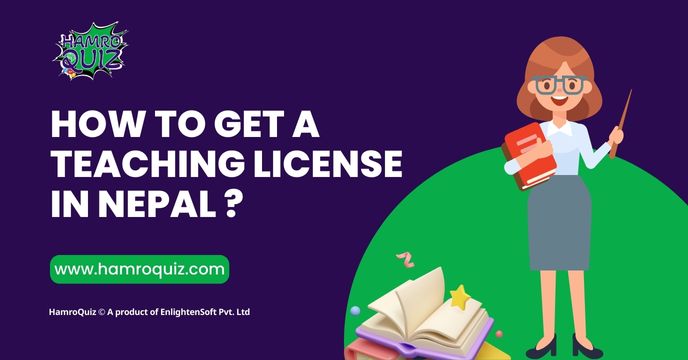
How to Become a Teacher in Nepal?
Are you curious about what a teaching license in Nepal is and how to obtain one? To lawfully practice as a teacher in a certain area, including foreign nations as well as in a local state, province, or Nation, you must obtain a teaching license. For a teacher to lawfully operate as a teacher in the designated area, they must possess a teaching license in any board within the educational system. In Nepal, there are two different kinds of teaching licenses: the Primary License and the Secondary License.
How Teacher Service Commission was Formed In Nepal and What is it?
The establishment of democracy in 2007 BS opened the door for school education to progress and become accessible to all citizens of Nepal, even if the country had no formal educational system until much later. A plan has been put in place by the National Education System Plan, 2028/2032, to guarantee the facilities and service conditions for teachers. Permanent teachers were appointed by the District Education Service Commission at first, followed by the District Education Committee's Selection Committee, the District Teacher Selection Committee, and the Regional Teacher Selection Committee, all operating under different titles and structures.
Before, choosing teachers was not neutral, independent, or completely free of politics; rather, it was changing the Education Act and other laws and regulations to the advantage of chosen groups of people. Even if fairness is guaranteed, advertisements will appear at some point, but the results won't be made public until the rainy season. It was claimed that when the results were published, no universal standards were applied. The appointment of teachers by the relevant bodies was not clearly defined, and the norms and regulations were not clearly understood.
With so many rules and regulation changes in the hiring of new teachers, The Teachers Service Commission (TSC) was established with the combined efforts of the Education Act 2028 and the Laws of Education 2058 to hire educators who are skilled, competent, and dedicated. The commission was established to oversee the entire recruitment process, including creating the syllabus for the teacher examination, training, and promotion, and advising the Ministry on issues related to the facilities, services, and issues with the instructors.
But even after its founding in the late 1950s, The TSC has consistently displayed inconsistencies in the way it administers the exam. The first test was administered in the early 1950s, and the second one in 2062 B.S. An examination was conducted in 2070 B.S. following an eight-year break. After that, the exam was conducted in 2080 last year.
Qualification for Teaching License in Nepal
- Requirements and Academic Background:
To apply for a teaching license,you must apply to the appropriate educational or government agency. The appropriate paperwork for the application should be included, such as proof of identity or citizenship, academic credentials, work experience, and additional certificates that may be needed.
Make sure you have the minimal education needed for the type of teaching you want to do (further education, secondary education, or primary education). Usually, you'll require a bachelor's degree in education or a closely related field. The following is a general overview of academic qualifications: - Primary Level Teacher For being selected for the program, 10+2 is the minimum requirement. Successful students get a Certificate in Primary Teaching from the National Centre for Education Development (NCED), an organization affiliated with the Ministry of Education, upon completion of a year-long course.
- Secondary Level Teacher A bachelor's degree and at least ten months of completed education training are the minimum requirements. Even without the training, applicants may still be eligible if they have completed a bachelor's degree in any of the following: science, mathematics, English, accounting, computer science, computer engineering, civil engineering, electrical engineering, animal husbandry, and crop science.
- Language Proficiency:
Since Nepali is the primary language of teaching in the majority of schools, proficiency in the language is typically required to earn a teaching license in Nepal. - Professional Competency:
It could be necessary for you to provide proof of your teaching certification. This could include passing an exam that evaluates your understanding of pedagogy, subject matter, and techniques for instruction, or passing a test of teaching competency. - Work Experience:
A minimum amount of teaching experience may be required for some teaching licenses, however, the more experience you have, the more likely you are to be chosen for higher-level teaching positions. - Document Submission:
Collect all the required paperwork, including certifications, academic transcripts, proof of citizenship or identity, passport-sized photos, and any additional paperwork the licensing authority requires. - Application Fee:
Follow the instructions provided by the licensing authorities to pay the application fee. You may be asked to pay the application fee of Rs. 700/-. The payment can be made through Rastriya Banijya Bank or Nepal Bank Limited. - Licensing Examination:
The curriculum will be provided by the council, and candidates must study for the license exam based on it. The exam will be of 100 marks out of which 60 marks are allocated for subjective questions and the remaining 40 marks are for objective questions. The exam covers a wide range of topics including general knowledge, psychology, education concepts, and even Nepali educational law. Subject matter experts will carefully code and anonymize the questions. Furthermore, there is no proof that the marking procedure is biased. - Interview and Assessment:
Successful candidates are requested to participate in an expert interview after the exam as a second screening process to confirm the qualifications of the chosen applicants. - Background Check:
A background check may be performed by some authorities to make sure candidates have no criminal records. - Approval and Issuance:
You will get your teaching license if you fulfill all the requirements and get through the licensing process. - Renewal:
A teaching license's duration in Nepal might vary, but it usually lasts for a set period, such as one or two years. It is advisable to monitor the expiration date of your teaching license and submit an application for renewal in advance. It could be necessary for renewal to participate in workshops or professional development programs to improve your teaching abilities.
Conclusion
In Nepal, acquiring a teaching license is a systematic process that guarantees entry into the teaching profession exclusively for those who meet the requirements. Your dream of getting a teaching license in Nepal can come true if you follow the above steps and put in enough preparation. Always consult the official TSC website for the most recent changes and more comprehensive information.
Frequently Asked Questions (FAQs):
- How to Apply for the Teaching License 2081?
- Visit theTeacher Service Commission’s official website.
- Fill in the required details and verify them thoroughly before submitting.
- Pay the application fee of Rs. 700/-. The payment can be made through Rastriya Banijya Bank or Nepal Bank Limited or you can pay online.
- After paying the application fee, print the voucher and make sure the payment details match your name.
- Keep your email, candidate code number, and password safe for future reference.
- What are the key points that should be considered before applying?
- Check the Eligibility criteria before applying.
- Submit the online application via the official TSC portal.
- Confirm all personal details and documents before submitting.
- Any changes post-submission will not be entertained by the TSC.
- For additional details, visit the official TSC website.
“For those who aspire to teach, this is a fantastic chance to join the Nepalese educational system and contribute to shaping the country's future. Best of Luck”
